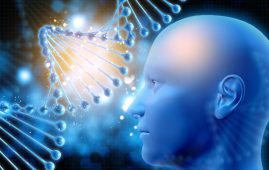

A new study led by Mass General Brigham researchers discovered that subanesthetic intravenous ketamine was effective and comparable to electroconvulsive therapy (ECT) in the treatment of non-psychotic, treatment-resistant depression. The researchers’ findings were reported in the New England Journal of Medicine.
“ECT has been the gold standard for treating severe depression for over 80 years,” said Amit Anand, MD, director of Psychiatry Translational Clinical Trials at Mass General Brigham and Professor of Psychiatry at Harvard Medical School. “But it is also a controversial treatment because it can cause memory loss, requires anesthesia and is associated with social stigma. This is the largest study comparing ketamine and ECT treatments for depression that has ever been done, and the only one that also measured impacts to memory.”
Major depression (MDD) is a prominent cause of disability globally, affecting an estimated 21 million adults in the United States. ECT involves electrically stimulating the brain to cause a seizure. Ketamine is a low-cost dissociative medication that has been licensed by the FDA as a sedative/analgesic and general anesthetic. Previous research has showed that low doses of the medication may have immediate antidepressant effects in persons with MDD.
From March 2017 to September 2022, 403 participants were randomized one-to-one to receive either ECT three times per week or ketamine twice per week for three weeks. Patients were tracked for six months following treatment and completed a depressive symptom self-assessment questionnaire, which also included memory tests and quality of life items.
The researchers discovered that 55% of those who received ketamine and 41% of those who received ECT reported at least a 50% improvement in their self-reported depressive symptoms and an improvement in their self-reported quality of life that lasted throughout the six-month monitoring period. Memory loss and musculoskeletal side effects were linked to ECT treatment. Ketamine treatment was not connected with any side effects other than a brief period of dissociation during treatment.
“For the ever-growing number of patients who do not respond to conventional psychiatric treatments and need a higher level of care, ECT continues to be the most effective treatment in treatment-resistant depression,” said Murat Altinay, MD, Psychiatrist and lead of the trial site at Cleveland Clinic. “This study shows us that intravenous ketamine was non-inferior to ECT for treatment of non-psychotic treatment resistant depression and could be considered as a suitable alternative treatment for the condition.”
The current study is the largest real-world comparison effectiveness trial of ECT vs. ketamine to date. The trial utilized a patient-centered strategy, collecting three types of independent depression ratings (patient, rater, and physician) with no active participant recruitment.
The authors point out that their findings are based on self-reported outcomes and that the open-label nature of the experiment may have influenced response rates. However, the patient-centeredness of the research and its real-world design may be a strength, allowing the findings to be more easily translated into clinical practice.
Anand’s team is now working on a follow-up study comparing ECT and ketamine treatments for patients suffering from acute suicidal depression to see if the same encouraging results can be obtained in that cohort.
“People with treatment-resistant depression suffer a great deal, so it is exciting that studies like this are adding new options for them,” said Anand. “With this real-world trial, the results are immediately transferable to the clinical setting.”
more recommended stories
 Caffeine and SIDS: A New Prevention Theory
Caffeine and SIDS: A New Prevention TheoryFor the first time in decades,.
 Microbial Metabolites Reveal Health Insights
Microbial Metabolites Reveal Health InsightsThe human body is not just.
 Reelin and Cocaine Addiction: A Breakthrough Study
Reelin and Cocaine Addiction: A Breakthrough StudyA groundbreaking study from the University.
 Preeclampsia and Stroke Risk: Long-Term Effects
Preeclampsia and Stroke Risk: Long-Term EffectsPreeclampsia (PE) – a hypertensive disorder.
 Statins and Depression: No Added Benefit
Statins and Depression: No Added BenefitWhat Are Statins Used For? Statins.
 Azithromycin Resistance Rises After Mass Treatment
Azithromycin Resistance Rises After Mass TreatmentMass drug administration (MDA) of azithromycin.
 Generative AI in Health Campaigns: A Game-Changer
Generative AI in Health Campaigns: A Game-ChangerMass media campaigns have long been.
 Molecular Stress in Aging Neurons Explained
Molecular Stress in Aging Neurons ExplainedAs the population ages, scientists are.
 Higher BMI and Hypothyroidism Risk Study
Higher BMI and Hypothyroidism Risk StudyA major longitudinal study from Canada.
 Therapeutic Plasma Exchange Reduces Biological Age
Therapeutic Plasma Exchange Reduces Biological AgeTherapeutic plasma exchange (TPE), especially when.

Leave a Comment